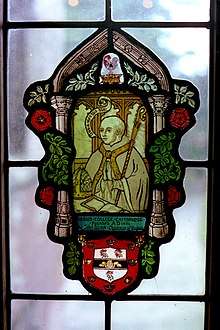John Alcock (bishop)
John Alcock (c. 1430 – 1 October 1500) was an English churchman, bishop and Lord Chancellor.
John Alcock | |
|---|---|
| Bishop of Ely | |
 Stained glass depicting John Alcock, in Jesus College, Cambridge | |
| In office | 6 October 1486 |
| Predecessor | John Morton |
| Successor | Richard Redman |
| Orders | |
| Consecration | 15 March 1472 |
| Personal details | |
| Born | c. 1430 Beverley, Yorkshire |
| Died | 1 October 1500 |
| Denomination | Roman Catholic |
| Previous post | Bishop of Rochester Bishop of Worcester |
Biography
Alcock was born at Beverley in Yorkshire, son of Sir William Alcock, Burgess of Kingston upon Hull and educated at Cambridge.[1] In 1461 he was made dean of St Stephen's Chapel, Westminster, and his subsequent promotion was rapid in both church and state. In the following year he was made Master of the Rolls,[2] and in 1470 was sent as ambassador to the court of Castile. He was nominated to the see of Rochester on 8 January 1472 and consecrated Bishop of Rochester on 15 March[3] and was successively translated to the see of Worcester on 15 July 1476[4] and the see of Ely on 6 October 1486.[5] He was the first president of the Council of the Marches in Wales from 1473 to 1500. He twice held the office of Lord Chancellor, once from June 1475 to September 1475 and then again from October 1485 to March 1487.[2]
Alcock was one of the leading pre-Reformation divines; he was a man of deep learning and also of great proficiency as an architect. Besides founding a charity at Beverley and a grammar school at Kingston upon Hull, he restored many churches and colleges; but his greatest achievement was the building of Jesus College, Cambridge, which he established on the site of the former Convent of St Radegund.
Alcock was appointed to the Council in 1470 and became Master of the Rolls in 1471, soon after being appointed tutor to King Edward IV's eldest son, Prince Edward. After the King's death he was with Prince Edward when he was intercepted by Richard, Duke of Gloucester, at Stony Stratford. Alcock was arrested and removed from office but soon rejoined the Council. He was with King Richard III when he entered York in August 1483 and was a member of the English delegation that met the Scots at Nottingham.
Later Alcock was one of several clerics who openly canvassed the proposition that Henry Tudor marry Elizabeth of York. Appointed temporary Lord Chancellor he opened King Henry VII's first Parliament on 7 November 1485 and became one of the new king's most trusted servants.
Alcock died on 1 October 1500[5] and lies buried in the Alcock Chantry in Ely Cathedral.
Princes in the Tower
Valerie Anand, a believer in the innocence of Richard III in the matter of The Princes in the Tower, points out that Alcock, the tutor of Edward V, never quarrelled with Richard III, either publicly or privately, but chose to "continue to work serenely beside Richard".[6] This would have been unthinkable if Alcock had any reason at all to suspect that King Richard had done any harm at all to young Edward.
Writings
Alcock's published writings, most of which are extremely rare, are: Mons Perfectionis, or the Hill of Perfection (London, 1497);[7] Gallicontus Johannis Alcock episcopi Eliensis ad frates suos curatas in sinodo apud Barnwell (1498), a good specimen of early English printing and quaint illustrations; The Castle of Labour, translated from the French (1536), and various other tracts and homilies.[8]
Citations
- "Alcock, John (ALCK469J)". A Cambridge Alumni Database. University of Cambridge.
- Fryde, et al. Handbook of British Chronology p. 88
- Fryde, et al. Handbook of British Chronology p. 268
- Fryde, et al. Handbook of British Chronology p. 280
- Fryde, et al. Handbook of British Chronology p. 245
- Anand, Valerie Crown of Roses (1989), p. 404
- Full text (page views) at Internet Archive.
- See J. Bass Mullinger's History of the University of Cambridge, vol. i.
References
| Wikisource has the text of the 1885–1900 Dictionary of National Biography's article about John Alcock. |
- Fryde, E. B.; Greenway, D. E.; Porter, S.; Roy, I. (1996). Handbook of British Chronology (Third revised ed.). Cambridge: Cambridge University Press. ISBN 0-521-56350-X.

| Political offices | ||
|---|---|---|
| Preceded by Laurence Booth |
Lord Chancellor 1475 |
Succeeded by Thomas Rotherham |
| Preceded by Thomas Rotherham |
Lord Chancellor 1485–1487 |
Succeeded by John Morton |
| Catholic Church titles | ||
| Preceded by Thomas Rotherham |
Bishop of Rochester 1472–1476 |
Succeeded by John Russell |
| Preceded by John Carpenter |
Bishop of Worcester 1476–1486 |
Succeeded by Robert Morton |
| Preceded by John Morton |
Bishop of Ely 1486–1500 |
Succeeded by Richard Redman |